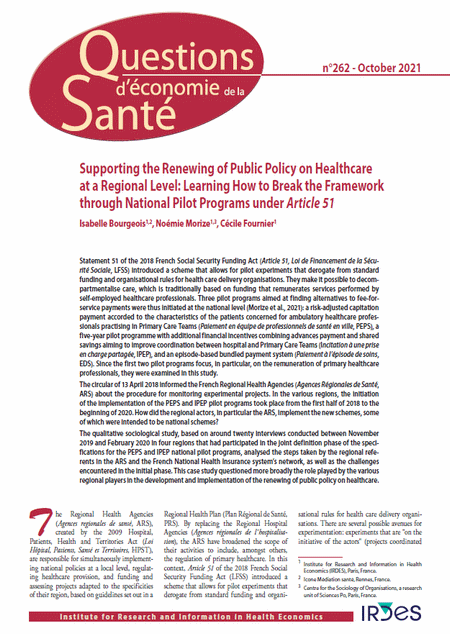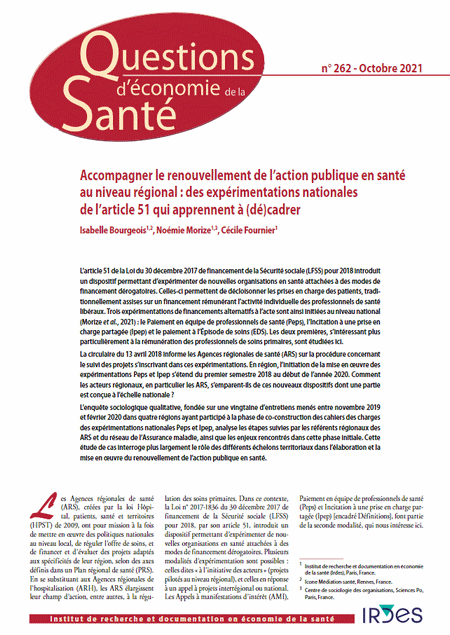Supporting the Renewing of Public Policy on Healthcare at a Regional Level: Learning How to Break the Framework through National Pilot Programs under Article 51
Bourgeois I. (IRDES, Icone Médiation santé), Morize N. (IRDES, Centre for the Sociology of Organisations, a research unit of Sciences Po), Fournier C. (IRDES)
Questions d'économie de la santé (Issues in Health Economics) n° 262 - Octobre 2021
ABSTRACT
Statement 51 of the 2018 French Social Security Funding Act (Article 51, Loi de Financement de la Sécurité Sociale, LFSS) introduced a scheme that allows for pilot experiments that derogate from standard funding and organisational rules for health care delivery organisations. They make it possible to decompartmentalise care, which is traditionally based on funding that remunerates services performed by self-employed healthcare professionals. Three pilot programs aimed at finding alternatives to fee-forservice payments were thus initiated at the national level (Morize et al., 2021): a risk-adjusted capitation payment accorded to the characteristics of the patients concerned for ambulatory healthcare professionals practising in Primary Care Teams (Paiement en équipe de professionnels de santé en ville, PEPS), a five-year pilot programme with additional financial incentives combining advances payment and shared savings aiming to improve coordination between hospital and Primary Care Teams (Incitation à une prise en charge partagée, IPEP), and an episode-based bundled payment system (Paiement à l'épisode de soins, EDS). Since the first two pilot programs focus, in particular, on the remuneration of primary healthcare professionals, they were examined in this study.
The circular of 13 April 2018 informed the French Regional Health Agencies (Agences Régionales de Santé, ARS) about the procedure for monitoring experimental projects. In the various regions, the initiation of the implementation of the PEPS and IPEP pilot programs took place from the first half of 2018 to the beginning of 2020. How did the regional actors, in particular the ARS, implement the new schemes, some of which were intended to be national schemes?
The qualitative sociological study, based on around twenty interviews conducted between November 2019 and February 2020 in four regions that had participated in the joint definition phase of the specifications for the PEPS and IPEP national pilot programs, analysed the steps taken by the regional referents in the ARS and the French National Health Insurance system's network, as well as the challenges encountered in the initial phase. This case study questioned more broadly the role played by the various regional players in the development and implementation of the renewing of public policy on healthcare.
See also Questions d'économie de la santé n° 262 in French: Accompagner le renouvellement de l'action publique en santé au niveau régional : des expérimentations nationales de l'article 51 qui apprennent à (dé)cadrer.

